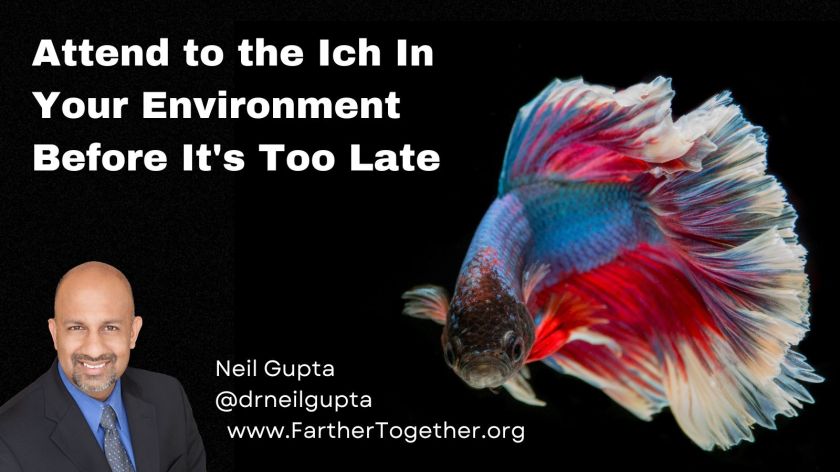In college, I purchased a beta fish to keep me company in my dorm room. I’d never owned any sort of animal, so it was my first time navigating the waters to care for someone else. With the recommendations from the store associate, I purchased the tank, special beta fish blood worms (not sure if I was being taken in buying the special food), and dechlorination tabs. I thought I was all set!
I named my fish Butch and kept him right on my desk to make sure I fed and talked to him each day. After about six months, I noticed a small, white granule sticking to his back fin one morning. I didn’t think anything of it, and Butch seemed to be happy. Checking on him through the next day or two, I noticed that more granules seemed to appear moving from the fin up his body. It looked like whatever it was touching seemed to incapacitate that part of him from moving. At one point, Butch’s side fins were flapping but it’s tail was dragging motionless behind.
Unsure of what to do (this was before the internet became our “go-to” for medical advice), I went back to the store. The associate told me that the fish had “ich” – an external parasite that is prevalent with beta fish. A parasite? I assumed the associate was going to tell me to flush Butch down the toilet, say a prayer, and buy a new one.
Instead, he told me about the importance of cleaning the tank and gave me medicine with instructions on how to get him better! I couldn’t believe it! There was a way to save him! I purchased the medicine and did exactly what he said to get Butch back to normal! All I had to do was treat the environment to keep him happy and healthy!
Isn’t it the same for us at times? One minute, we are happy swimming in our fishbowl; later, we find ourselves in some kind of paralysis. Our initial thought might question how that even happened, not realizing the slowly growing parasite that crept up on us slowly. It may have started with a slight itch or sense of fatigue. We explained it away to something external that would go away on its own. Then, the next thing we know, we feel immobilized and searching for help.
Being aware of our environment and keeping it clean from impurities is a skill and necessary to our growth and well-being. It’s not about how strong or capable we are; left to a polluted environment, it can be toxic. Here are three strategies for you to reflect on and consider in attending to the “ich” in your environment before it’s too late:
- Are Your Core Values Leading the Work? Environments tend to get dirty when the core values from the leadership aren’t clear and evident in the organization. There may be a tendency to prioritize work-related issues being more necessary over this, but not investing the time and focus on developing, communicating, and keeping the core values can be costly. In education, if we truly believe in the whole child, we will do what’s best for our students first.
- Are You Fostering Open Communication and Dialogue? I get most worried when meetings are held, and limited conversations take place to provide insights, alternatives, questions, or thoughts. While some decisions may have to be made at the end of the day which may create disagreement with others, it’s important to engage with people from various roles to understand, ask questions, seek alternatives, and provide input.
- Are you Promoting an Environment of Collaboration? I still marvel at how true leaders create a sense of collaboration by inviting others into dialogue and engaging in partnerships and shared work. I get leery of people in leadership roles who don’t build bridges and make positive connections to invite, seek a shared vision, and foster collaboration and unity with others.
How’s your water doing? Anything on your fin? For some, it might be a nagging fleck of something attached to your foot…for now. It feels harmless, but it does catch your attention. If that’s the case, I challenge you to prioritize addressing the environment before it worsens. Investing the time to clean your environment now can have a profound impact on the future.


